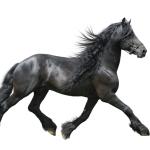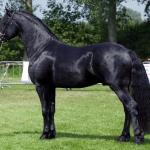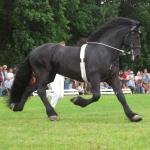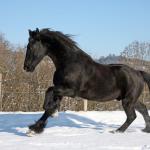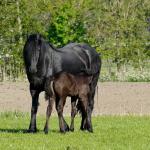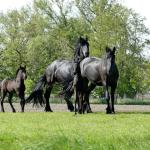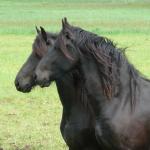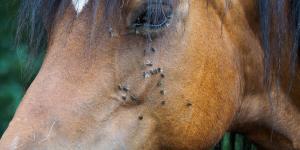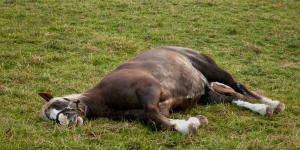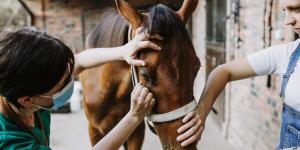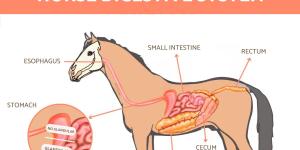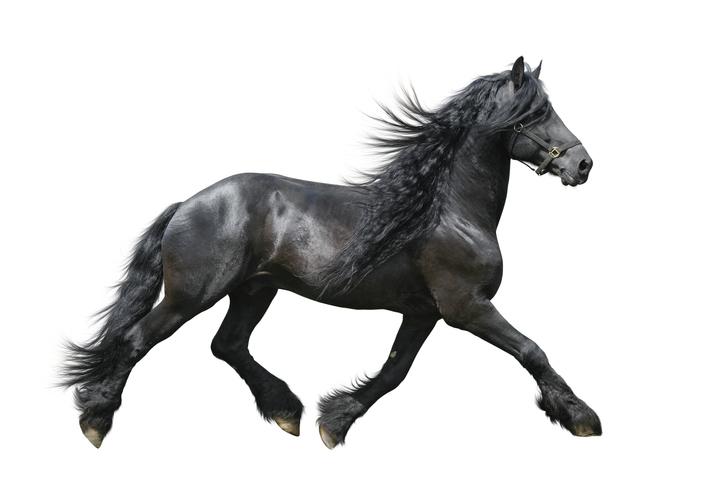Friesian Horse
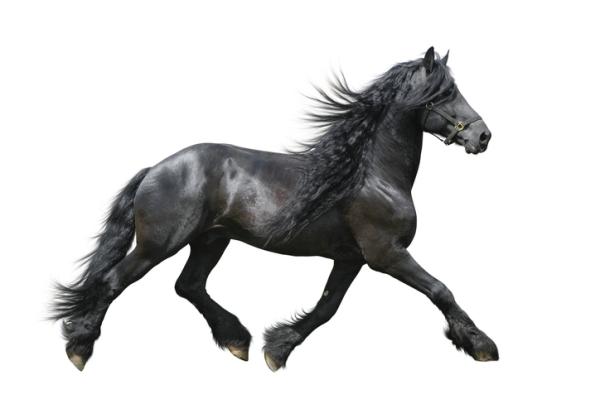
The Friesian horse, probably one of the most popular and appreciated horse breeds in the world, is the only equine breed originating from Holland. It stands out for its muscular body, shiny coat, wild mane and strong limbs. For centuries it was employed as a war horse, participating in the such famous conflicts as the Eighty Years' War or the Crusades. There are many other curious facts about the breed, which you can discover by reading our AnimalWised breed file. While we share the characteristics, temperament, health problems and more of the Friesian horse breed, you can also find more facts about different breeds in our animal files section.
- Europe
- Netherlands
Origin of the Friesian horse
Friesian horses are indigenous to Holland and the only horses originating from this country. Specifically, they come from the beautiful province of Friesland. The Friesian horse breed origins date back to before 500 BC, so we are discussing a truly ancient equine breed. In the 1st century AD, these equines were already being captured in marble statues and other works of art of the time. They usually appeared accompanying monarchs and generals. They were so appreciated in Friesland that the locals continued the breeding of these horses, since they were so valuable for both war and farm work. In fact, they became so popular the rest of the Dutch horse breeds ended up disappearing.
This breed remained pure until the time of the Crusades, at which time crosses between Friesians and Arab thoroughbreds or Spanish thoroughbreds began to occur. In the 19th century, the breed was on the brink of disappearing. This was not accidental, but a result of the end of the fiefs and the large plantations where the Friesians employed to work.
But the Friesian breed managed to be revived thanks to their skills for racing. This made them popular at festivals in the Dutch provinces at that time. With the arrival of other more competitive breeds in the field, the role of the Friesian as a racehorse ended in 1891. At this time the last Friesian horse race was held in the province of Friesland. They also had to compete with other, rougher breeds of livestock, so the Friesians were seriously threatened. The breed's continuation is currently assured thanks to its development and conservation by the Het Friese Paarden-Stamboek, an association recognized in 1954 by Queen Juliana as a Royal Association.
Physical characteristics of Friesian horses
Friesian horses have a solid and robust body. They are of a considerable weight, with some specimens reaching up to a ton. Despite this, the average weight of a Friesian is between 600 and 900 kg, measuring about 1.60 and 1.70 meters in height at the withers. The life expectancy of a Friesian usually ranges from 25 to 30 years. Their legs are relatively short and neck very erect. The chest is large and muscular like the rest of the body. The head has an elegant shape, as it is elongated with light jaws. It has large and bright eyes, with a deep and expressive gaze, and small pointed ears.
The coat of a Friesian is considered one of the strongest aspects of the breed, with a bushy mane and tail. Braids can occur in both spontaneously, an imperfect, but also very beautiful. They have a lock of hair at the end of their legs, as well as a bangs on the head that connect to the mane. This gives an arched shape to their neck. The only accepted color in the Friesians is total or absolute black. Some specimens with jet black or almost black browns have been recognized. Small white spots are accepted on the forehead.
The temperament of Friesian horses
One of the reasons why Friesian horses have been so valued historically is only partly due to their strength and robustness. They also have a special character. These horses are characterized by having a calm and very friendly temperament, being more sociable and balanced than some other breeds. All this makes Friesians the ideal horses to carry out tasks in fields for livestock, agriculture, war, racing or dressage. They are one of the most versatile breeds for this reason.
They are ideal horses for dressage due to the ability to learn skills in a short period of time. Their intelligence makes them suitable for riding schools where their temperament and docility play into their favor. They are used in riding schools of the highest caliber.
Caring for Friesian horses
In order for our Frisian to be in the best condition, we must pay careful attention. We need to be specifically careful with their ears and ensure they are cleaned regularly. They are particularly prone to hearing obstructions. To clean a Friesian horse's ears, we need to use some clean gauze and water to wipe the outer ear. Cleaning of the ear canal should only be carried out by professionals.
We also need to carefully monitor their teeth. Oral checkups should be carried out regularly by a specialist and we need to brush them regularly ourselves. If we do not, the Friesian is prone to dental problems such as malocclusions, abscesses or infections.
Finally, it is worth noting the importance of keeping the coat of our Friesian in good condition. For this we must carry out at least one daily brushing at least once a day. This is to remove dirt and excess hair. Horses sweat and this can mean we need a hard brush to remove the accumulated dirt. Bathing is regularly required, but we need to minimize the use of soaps.
To finish we will highlight the importance of offering a balanced and quality diet to the individual horse. You should allow them to graze calmly for greater well-being, as well as leaving fresh and clean water at their disposal at all times.
Friesian horse health
Despite all the benefits that the Friesian horse presents, we must know that they are delicate animals and that they may present a certain genetic predisposition to the development of certain common diseases in horses. One of the pathologies that most concern the owners of a horse, whatever the breed it may be, is colic. This is very painful and usually a symptom that something is wrong with the horse's digestive system. Colic may indicate the presence of intestinal disorders of various types and severity. They should not be ignored and it is advisable to carry out a review with a veterinary specialist in horses.
On the other hand, Friesians have been found to be especially stress-sensitive horses. Although all horses are sensitive animals, Friesians seem to suffer more in situations that are stressful to them. To avoid suffering in our Friesian, we need to reduce the potential stressors in their environment. We need to avoid situations which can cause anxiety and promote positive activities. Maintaining a healthy and balanced relationship with them is also imperative.
We will finish this bree file on the Friesian horse by remembering the importance of making periodic veterinary visits every 6 or 12 months. These checkups allow the horse's health status to be assessed. We need to strictly follow the vaccination schedule for horses that the specialist sets, as well as carry out deworming against common horse parasites or other care suggested by the veterinarian. We also need to ensure we watch out for specific symptoms of illness, such as unexplained weight loss.
Friesian Horse photos
